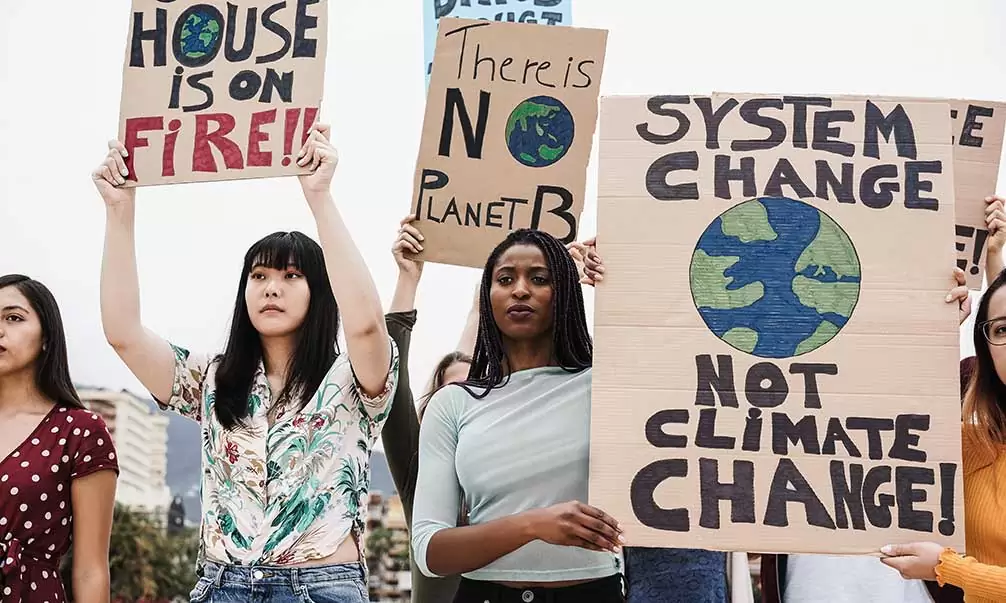did you know that global warming is one of the most serious environmental problems threatening our planet? Its consequences include potential flooding, loss of agricultural production, deforestation, extinction of animal species and many others. For this reason, leading restaurants have adopted a responsible approach to climate change in the hospitality industry.
Your restaurant business can take concrete and effective actions to contribute to environmental sustainability. It is not necessary to wait for governmental guidelines or regulations, as you can help to counteract the climate emergency right now.
interested? Below, we propose 22 effective strategies for your restaurant to collaborate with fast food and climate change:
1. Install water reducers in your kitchen and bathrooms
Currently, very efficient devices have been created to make the most of running water in the operations of the hotel and catering sector. These include flow-reducing taps, which work by adding a stream of air to the liquid used. This allows your employees or customers to make the most of the water without detracting from their experience.
And indeed, the amount required is reduced to more optimal performance levels. As a result, you save money and generate less liquid waste.
2. Change your food presentation policies
do you avoid changing portion sizes at the request of your customers? Then you should know that many side dishes that you insist on serving will end up in the rubbish bin.
These actions aim to strengthen your brand and increase your social media presence, but the waste produced is unsustainable. Equally, you have to please your diners if they want to keep the leftovers to take home. This is all part of a new responsible approach to catering, committed to the needs of this millennium.
3. Incorporate the use of bicycles in your deliveries
do you want to implement an economical and very sustainable system to reduce the emission of global warming gases? Then buy some bicycles and start your new delivery service. This is a strategy that will help you meet your new environmental goals in the very short term.
On the other hand, you will need a much lower monetary investment than in other means of transport. Don’t forget that the idea is to reduce polluting processes in the various production phases of your catering business.
4. Install computerised administrative management systems
Using mobile devices for administrative management is much more efficient for the conservation of the environment. For this reason, install applications specially created to work with inventory, reservations, invoicing and similar processes.
As a result, you will significantly reduce the use of paper and other resources that contribute to the deforestation of forests.
5. Use environmentally friendly detergents
did you know that in the hospitality sector, the use of detergents is one of the most environmentally damaging factors? The reason is related to the presence of chemicals and toxic substances in most of these products. Therefore, opting for biodegradable options represents a great opportunity to achieve greater sustainability with little effort.
Contact local suppliers that specialise in selling natural, low-impact cleaning products. This will bring you closer to your goals to reduce the emission of gases that contribute to climate change.
6. Implement a waste management programme
Focus your efforts on actively reducing waste produced in your hospitality business during the working day. Also, use your food waste for composting and other useful eco-friendly products.
If you have oil left over from a preparation, use it to make biofuel, candles or soaps. The idea is to set up a waste management project that allows you to make use of these materials.
7. Reduce food waste in your business
Studies show that about one third of the food produced worldwide ends up in the rubbish. This generates millions of euros in losses and is responsible for a large percentage of greenhouse gases. The good news is that your hospitality business can benefit financially by combating food waste.
Incorporate special promotions with surplus food from your preparations, using specialised mobile applications for this purpose. This is a creative way to earn additional profits while helping to counteract hunger on the planet.
8. Increase the supply of plant-based dishes
Specialists estimate that in the not too distant future, the resources needed to feed the population through livestock farming will be unsustainable. For this reason, other alternatives are currently being explored in the restaurant industry, such as plant-based proteins.

In our country, the number of people who prefer vegan or meat-free diets is increasing every day. In addition, it has been amply demonstrated that the processes linked to livestock farming have a very negative influence on global warming.
9. Spread your new sustainable vision for countering climate change
This is a great opportunity to spread the word about your actions to care for the planet and a better future. To do so, use your social media to broadcast messages such as “walk reducesCO2emissions” or “use biodegradable materials to enjoy your food”.
Also, print these announcements on posters and place them in visible places within the establishment. The effect on your visitors and followers will be very positive, as it will be projected beyond your premises. As a result, you will become a multiplier of positive measures to take care of our planet.
10. Incorporate the possibility of eliminating extras in your menu
Every day more and more restaurants, bars and cafés offer their customers the option of eliminating side dishes or extras in their preparations. As a result, they have the possibility to buy what they really need, eliminating chopsticks, napkins, sauce sachets and others.
The problem is that many of these items are not used by diners and are discarded. So how can you implement this strategy in your restaurant business? Install a mobile application for order management, which allows customers to select extras according to their interests.
11. Use natural lighting systems
Install large windows in your restaurant that facilitate lighting through sunlight, reducing the use of artificial means. In addition, plan your opening hours so that you make the most of daytime routines.
In this way, you will focus the performance of your business around more sustainable energy sources.
12. Use sustainable packaging for home delivery
All catering businesses should implement sustainable containers in their delivery and collection systems. This will allow the production of solid waste to be reduced to low environmental impact levels.
In a short time, containers used to transport food should be replaced by other compostable presentations. This is the case for products made from bamboo, corn starch, palm leaves and sugar cane.
On the other hand, reusable containers are suitable for displaying the colours of your restaurant, café or bar business. It’s a creative way to link an environmentally responsible image to your business. Best of all, you reduce your impact on nature while building customer loyalty and saving money in the process.
13. Buy local, seasonal produce
By incorporating ingredients from distant regions into your menu, you contribute to the emission of environmentally harmful gases. Also, by using out-of-season foods, you participate in processes that use large amounts of energy in controlling the atmosphere. So how can you avoid this practice?
A good idea is to buy your produce at local markets or to implement your own vegetable garden. In this way, you make a relevant contribution to providing a service without harming the climate and the biosphere.
14. Take advantage of second-hand furniture that is in good condition
Keep in mind that many of the elements in your living room, terrace or kitchen should not be strictly new. To help reduce emissions, discard the unnecessary and reuse your furniture whenever possible. Keep in mind that there are now shops that will help you find good second-hand alternatives.
Alternatively, contact local artists who restore or decorate from recycled materials. This is a positive way to enhance the ambience of your restaurant, while supporting the creative talent in your community.
15. Put in more efficient dispensing containers
This involves placing containers in your catering business to optimally dispense products such as sugar, oil, sauces, salt and pepper. This significantly eliminates the agglomeration of polluting waste associated with each serving.
In fact, the procedure is limited to buying as many containers as you need and then filling them as required. This principle is efficient for other supplies such as soap, antibacterial gel and other personal hygiene products. And a very positive thing is that you will project your new sustainable values in every space of the premises.
16. Use products with guaranteed sustainability
The organic mass used by wild animals is much lower than that invested in those that live in captivity. Opting for these foods is an alternative way to reduce your impact on the environment. In addition, when you buy products that guarantee a sustainable process, you get a better price by cutting out the middleman.
Indeed, organic livestock farming is a way to reduce the impact our sector has on the ecosystem. This is because you contribute to maintaining the grasslands in good condition, and you avoid the use of agrochemicals and heavy machinery.
17. Opt for recycled paper in your restaurant, a more sustainable format
This is another action with positive results, without the need for major investments and in the very short term. The idea is to contact suppliers of recycled paper for personal hygiene and office material. These products are obtained from a strict process, which seeks to continuously reuse previously discarded cardboard or paper.
As a result, you will allow it to be used in numerous cycles and reduce the production of organic waste. And the best thing is that you contribute to the conservation of many plant species that are currently exploited indiscriminately.
18. Place your waste in ecological containers
This is a proven strategy to combat the alarming levels of pollution that characterise our society. Therefore, sort your waste according to ecological criteria, and then transfer it to special locations. These places are known as “puntos limpios” (clean points), and have the appropriate machinery to recycle the material for new purposes.

In recent years, this process has been perfected in the hospitality industry to the point of reaching unprecedented levels of efficiency. For example, kraft paper is a derivative of this system that is widely used in the manufacture of bags for transporting food. And its potential continues to grow, due to the development of new techniques for sorting and utilising solid waste.
19. Buy products in bulk
It is very common for cereals, nuts and pasta to be presented in plasticised formats. However, it is possible to find suppliers who guarantee the same products in bulk and at very affordable prices.
Another option is to ask packaging companies to remove unnecessary layers of packaging from your products.
20. Optimise energy consumption
Progressively implement the use of appliances that run on other , more sustainable energy sources. In this respect, it is already quite common to see restaurant chains that have invested in systems powered by solar panels or wind energy. And although the costs are not exactly low, in a short time you will be able to recover the investment with ample benefits.
On the other hand, it is important that you link up with suppliers that stand out for their commitment to the environment. And by adding more and more businesses interested in diversifying their energy sources, emissions will be minimised.
21. Bottled water supply decreases
The bottled water industry makes a vital resource for humanity more expensive, while depleting and depleting public water supplies. It also contributes to the production of tons of materials that pollute the ecosystem. For this reason, the idea is to take advantage of the quality of tap water that characterises our country.
As for the sale of sugary drinks, it installs vending machines for multiple refills in the same glass.
22. Use energy-optimised appliances
Another effective strategy is to promote the conscious use of electricity in equipment, appliances and other devices in your restaurant. To do this, check if they are classified as “class A” items on their labels.
As a result, the volume of electricity consumption will be reduced in a very short time. On the one hand you have the benefit of lower bills. On the other hand, you will have made a significant contribution to controlling the factors that affect climate change.
This is the culmination of our post on climate change in the hospitality industry and the main actions your restaurant can take to counteract it. Don’t forget to share this information to promote more sustainable practices within the hospitality sector. Also, in our digital catalogue you will be able to buy biodegradable packaging to curb the effects of global warming. See you there!

